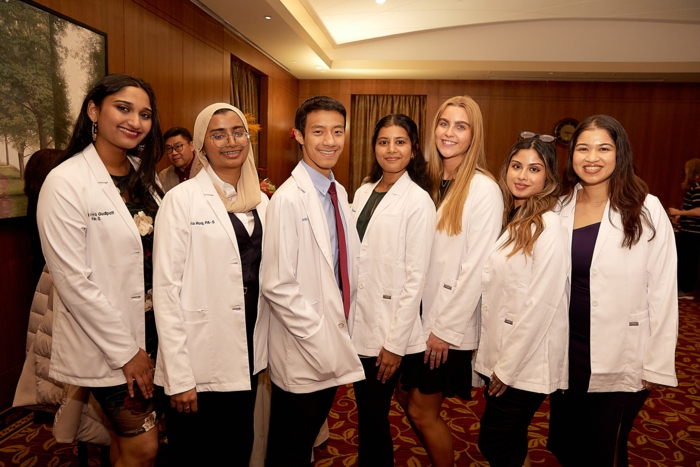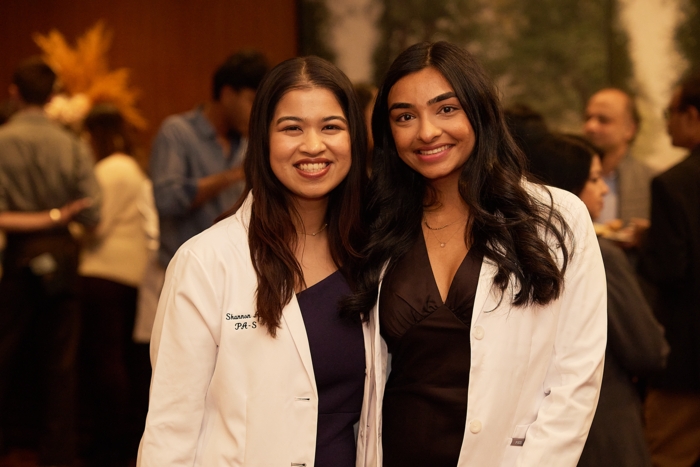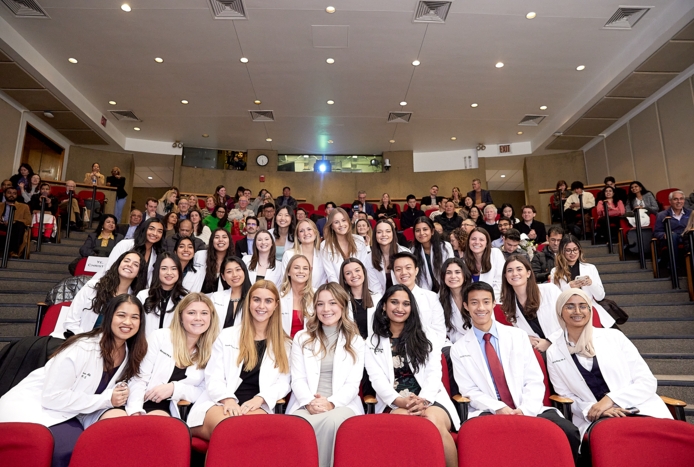Christine Ye traces her passion for medicine back to seventh grade, when she joined a medical mission to Haiti and saw first-hand how access to health care can create stark disparities.
“I remember thinking, ‘This issue could have been solved with a vitamin supplement, or a bandaid, or neosporin—something simple,’” said Ye, 26, from Valley Stream, N.Y. “New York is such a different world, but even within New York there are disparities. That just stuck with me; seeing the injustice in health care access was something that always resonated with me.”
Ye, B.S. '20, graduated from Cornell University on a pre-medical track, but after her post-graduate experiences, she shifted gears. She worked as a community health worker in the South Bronx during the COVID-19 pandemic, educating the community on the disease’s transmission and prevention. She also was a medical assistant at a Long Island medical practice, where she worked closely with physician assistants. She saw how closely physician assistants work with patients, how integral they are in the facilitation of coordinated care and the flexibility they have to change medical specialities. Ultimately, she knew that a career as a physician assistant aligned with how she wants to take care of others and knew that the field was the right fit for her.

Physician assistant students in the Class of 2026 celebrate earning their white coats. From left: Sri Sravya Gudiapti, Faria Huq, Justin Hoang, Suvetha Sivakumar, Gabrielle Bourdeau, Afiat Sumia, Shannon Ali.
On Feb. 15, Ye joined 25 of her fellow classmates in earning their short white coats as the newest students in Weill Cornell Medicine’s Master of Science in Health Sciences for Physician Assistants Program. The program’s annual white coat ceremony celebrated the Class of 2026 and represented the start of the students’ new educational experience.
“To me, the white coat is a reminder that I’m here to really serve and help others,” Ye said.
Dr. Gerard J. Marciano, co-chair and program director of the physician assistant program, noted that the ceremony itself is “a significant milestone to benchmark your journey toward becoming confident health care professionals.”
“Today reminds us of the meaning of the coat and the privileges and rights it brings with it,” he added. “Your white coat is one of the keys that will give you access to the world of medical practice and to the very privileged care of our patients from this moment forward.”
Dr. Robert Harrington, the Stephen and Suzanne Weiss Dean of Weill Cornell Medicine and provost for medical affairs of Cornell University, has a very personal connection to the path the students are taking: Both his wife, Rhonda Larsen, and their youngest daughter are physician assistants.
Dr. Harrington also shares another connection: He conducted his cardiology and research training at Duke University, where Dr. Eugene A. Stead, Jr. founded the physician assistant profession itself. During the white coat ceremony, Dr. Harrington encouraged the students to consider a quote from Dr. Stead as they embark on the next stage of their educational journeys: “‘Education is what you have left after you’ve forgotten the facts.’”
“What Dr. Stead was getting at was, yes, you’re required to memorize a lot of things, take exams — do all the things required to be a certified PA, to be a member of a health care team,” Dr. Harrington said, noting that clinicians can easily brush up on scientific and medical facts. “But it’s how you take care of people, how you talk to people, how you interact with members of the team—that’s what we are teaching here.”

Physician assistant students Shannon Ali, left, and Veerali Patel, right, celebrate earning their white coats.
Dr. Yoon Kang, senior associate dean for education and the Richard P. Cohen, M.D. Professor of Medical Education, told the class that they will learn as much about themselves as they will about medicine over the course of the next 26 months. It will be a challenging and transformative experience.
“Fortunately, you are in the hands of talented teachers and role models — together you will build the critical foundation of your future career,” she said. “Be assured, you came to the right place when you came to Weill Cornell Medicine. I hope you remember moments like today and reflect on your own personal journey during your studies here.”
That’s precisely what NewYork-Presbyterian/Weill Cornell Medical Center physician assistant Joseph Lalor did during the ceremony. As the ceremony’s alumni speaker, Lalor reflected on his own educational experience at Weill Cornell Medicine, from which he graduated just last year.
“Your white coat represents responsibility, first to yourself, to learn from those around you; to those you meet in clinical rotations; to those you meet in preclinical experiences; to those you will meet along the way,” he said. “And you have a responsibility to your loved ones when you wear a white coat—to make them proud of all the hard work you’ve done and to bring that forward.”

